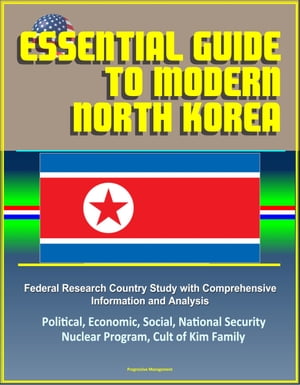national research coをよりお手頃なお値段でお届けします
national research coに特化したサイト口コミでの評価は高いです
Essential Guide to Modern North Korea: Federal Research Country Study with Comprehensive Information and Analysis - Political, Economic, Social, National Security, Nuclear Program, Cult of Kim Family【電子書籍】[ Progressive Management ]
Essential Guide to Modern North Korea: Federal Research Country Study with Comprehensive Information and Analysis - Political, Economic, Social, National Security, Nuclear Program, Cult of Kim Family【電子書籍】[ Progressive Management ]
<p>Professionally converted for accurate flowing-text e-book format reproduction, this ebook reproduces the official Library of Congress Federal Research Division Country Study of North Korea. Books in this series describe and analyze the nation's political, economic, social, and national security systems and institutions, and examine the interrelationships of those systems and the ways they are shaped by historical and cultural factors. Each study is written by a multidisciplinary team of social scientists. The authors seek to provide a basic understanding of the observed society, striving for a dynamic rather than a static portrayal. Particular attention is devoted to the people who make up the society, their origins, dominant beliefs and values, their common interests and the issues on which they are divided, the nature and extent of their involvement with national institutions, and their attitudes toward each other and toward their social system and political order.</p> <p>Contents: Chapter 1. Historical Setting * THE ORIGINS OF THE KOREAN NATION * KOREA IN THE NINETEENTH-CENTURY * THE RISE OF KOREAN NATIONALISM AND THE THREE KINGDOMS PERIOD * Paekche * Kogury? * Silla * Korea under Silla * UNIFICATION BY KORY? * THE CHOS?N DYNASTY * Florescence * Dynastic Decline * WORLD ORDER * JAPANESE COLONIALISM, 1910?45 * COMMUNISM * NATIONAL DIVISION IN THE 1940s * Tensions in the 1940s * U.S. and Soviet Occupations * The Arrival of Kim Il Sung * The Establishment of the Democratic People’s Republic of Korea * THE KOREAN WAR, 1950?53 * THE POSTWAR PERIOD * The Economy * Corporatism and the Chuch’e Idea * International Relations * NORTH?SOUTH RELATIONS IN THE TWENTY-FIRST CENTURY * Chapter 2. The Society and Its Environment * Helen-Louise Hunter * THE PHYSICAL ENVIRONMENT * Topography and Drainage * Climate * Environmental Factors * POPULATION * SOCIAL STRUCTURE AND VALUES * Creating a New Society * The Cult of Kim Il Sung * Class Society * The New Socialist Society * The Work Unit as the Basic Social Unit * A Thought-Controlled Society * The Elite Life in P’y?ngyang * The Privileged Life Beyond Money * Daily Life * A Society in Crisis * Militarized Society * Family Life * Children * Leisure Activities * Religion * EDUCATION * Primary Education * Middle School and Beyond * Higher Education * HEALTH CARE * Chapter 3. The Economy * David Kang * ECONOMIC DEVELOPMENT, 1940s?90s * The Economy after World War II * ECONOMIC INFRASTRUCTURE SINCE THE AGRICULTURE, THE FAMINE OF 1995?98, AND North Korea’s Development Strategy * EARLY 1990s * Comparisons with South Korea * Organization * Natural Resources * Energy and Power Generation * Transportation * Forestry and Fishing * Telecommunications and the Internet * Government Budget * ECONOMIC CHANGES * Collapse in the 1990s * Causes of the Famine * Effects of the Famine * Post-Famine Situation * Economic Reforms * Reform of the Public Distribution System * Banking and Finance * Legal and Administrative Reforms * Special Economic Zones * Top-Down Reform Measures * Assessment of the Economic Reforms * FOREIGN ECONOMIC RELATION * MUCH MORE</p>画面が切り替わりますので、しばらくお待ち下さい。
※ご購入は、楽天kobo商品ページからお願いします。
※切り替わらない場合は、こちら をクリックして下さい。
※このページからは注文できません。
- 商品価格:743円
- レビュー件数:0件
- レビュー平均:0(5点満点)
- ショップ :楽天Kobo電子書籍ストア
© national research coをよりお手頃なお値段でお届けします
